Key points in this article:
- Selling home decor online offers global reach, flexibility, and lower overhead costs.
- Current trends in home decor include sustainability, multifunctional furniture, biophilic design, and artisan pieces.
- Some of the key challenges in starting a home decor business are high competition, supply chain issues, shipping logistics, and fast-changing styles.
- Startup costs cover product sourcing, website setup, branding, photography, packaging, and marketing.
- You can boost your chances of success with a strong marketing strategy using, for instance, social media, SEO, and influencer collaborations to attract and retain customers.
Do you have a passion for interior design, an eye for detail, an affinity for aesthetics, and the desire to start selling furnishings and other home decor products?
Discover all the steps involved in setting up your online store and start selling today to customers all around the world to help each one bring more flair to their living space.
DIY, bedding, furniture, bathrooms, interior design for professionals, household linens, tableware, gardening... There are all kinds of sectors and ideas to consider.
Choice of your supplier, optimization of your network of service providers, legal status, integration of articles into your platform, promotion of your home decor shop at the local and national levels... Exciting challenges await you as soon as you craft the concept for your home decor business!
In this article, we will tell you all about what to know before launching a home decor business and provide you with steps and tips to make your decorating concept a reality—your ecommerce success!
Home decor industry: Key trends, opportunities, and challenges
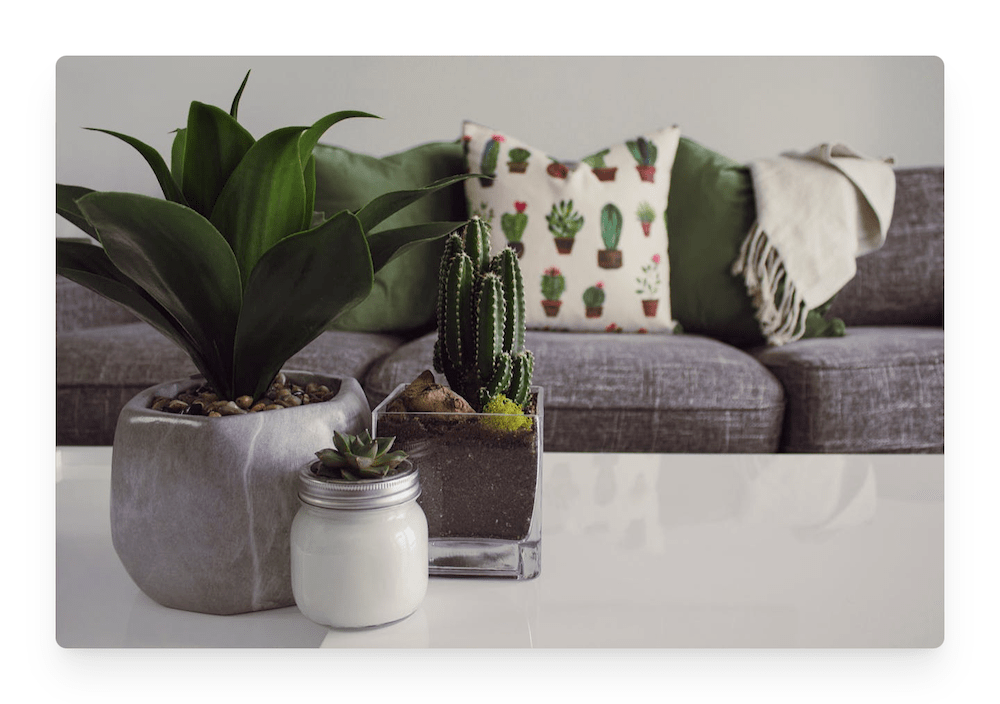
Photo by Designecologist
What are some important trends to know for the home decor industry?
When starting your own home decor business, you will want to check out all the latest trends to see how you can better adapt your offerings for your ideal buyer. Here are some of the industry’s current trends to be aware of as you get ready to launch your venture:
- Sustainable and eco-friendly design: With increasing awareness about environmental issues, many consumers are leaning towards sustainable and eco-friendly interior decor options. This includes, for example, using recycled materials, repurposing furniture, and opting for products with minimal carbon footprint.
- Biophilic design: Biophilic design involves incorporating elements of nature into indoor spaces to enhance well-being and provide a calming atmosphere. This decorating trend encompasses features like indoor plants, natural materials (wood, stone), and large windows to bring in natural light.
- Neutral color palettes: Neutral colors like whites, grays, and earth tones are popular choices for creating serene and versatile living spaces. These colors serve as a backdrop for other interior design elements and allow homeowners to change accents easily.
- Maximalism and bold patterns: On the other end of the spectrum, maximalist designs have gained traction, featuring vibrant colors, bold patterns, and the mixing of different textures to produce visually striking and eclectic interiors.
- Multifunctional furniture: With the growing rate of people starting to live in smaller living spaces, multifunctional furniture pieces like sofa beds, foldable tables, and modular storage solutions are in high demand to maximize space utilization.
- Smart home integration: Home automation and smart technology are being seamlessly integrated into home decor. This includes voice-activated assistants, smart thermostats, lighting control, and other internet-of-things (IoT) devices.
- Vintage and antique revival: Vintage and antique items are being incorporated into modern interiors, adding a sense of history and character to any room. This can entail vintage furnishings, accessories, and even architectural salvage.
- Wellness-centric design: The concept of wellness-driven design focuses on creating environments that work to promote mental and physical well-being. This involves features like meditation spaces, aromatherapy diffusers, and ergonomic furniture.
- Artisan and handcrafted pieces: Consumers are showing a greater appreciation for handcrafted and artisanal items that add a personal touch and uniqueness to their homes.
- Cottagecore and rustic aesthetics: The “cottagecore” trend celebrates a romanticized rural lifestyle, characterized by rustic and vintage elements, floral patterns, and cozy, comfortable spaces.
- Metallic accents: Metallic finishes, particularly gold and brass, are used to add a touch of luxury and elegance to interiors. These accents are often incorporated through lighting fixtures, decorative accessories, and furniture legs.
- Global and cultural influences: A fusion of global design elements, such as Moroccan, Scandinavian, and Japanese aesthetics, are growing in popularity, allowing homeowners to infuse their interior and exterior spaces with diverse cultural influences.
Is an online home decor business likely to be profitable?
An online home decor business offers loads of potential to be profitable with the right strategies in place. The home decor industry has experienced significant growth, especially with the rise of ecommerce and social media.
A well-executed online home decor business can reach a global audience, reduce overhead costs compared to a brick-and-mortar store, and offer a wide variety of products.
The best way to increase the likelihood of profitability with your online home decor business is to focus on offering unique and high-quality products that cater to specific shopper preferences.
Effective marketing strategies, such as utilizing social media platforms, influencer collaborations, and engaging visual content, can drive traffic and sales.
Providing excellent customer service, offering competitive pricing, and ensuring a user-friendly, easy online shopping experience are crucial to help you to continue to earn money over the long haul.
Performing continuous market research, adapting to trends, and maintaining a strong online presence will contribute to the success and profitability of your online home decor business.
What are the challenges of starting a home decor business?
Starting a home decor business can be exciting, but it also comes with its own set of challenges. Here are a few key challenges you might encounter:
- Intense competition: The home decor market is highly competitive, with a multitude of established brands and newcomers vying for consumers’ attention. Standing out and differentiating your business from competitors with unique ideas or services can be a significant challenge.
- Visual presentation: In the home decor industry, aesthetics and visual appeal are crucial. Creating high-quality product images, virtual room displays, and an engaging website design is essential to attract and retain customers.
- Supply chain and inventory management: Managing store inventory levels, sourcing products, and ensuring timely deliveries for your business can be complex, especially if you’re working with multiple suppliers or dropshipping. Striking a balance between having enough stock and avoiding overstocking can be tricky for a home decor business.
- Shipping costs and logistics: Shipping costs, especially for larger or delicate home decor items, can significantly impact your company’s bottom line. It’s therefore essential that you take the time to find cost-effective and reliable shipping solutions while ensuring safe delivery.
- Trend sensitivity: The home decor industry is heavily influenced by trends, and staying up-to-date with the latest styles and preferences is important. Failing to adapt to changing trends could lead to a decline in consumer interest for your business.
How do you start a home decor business?
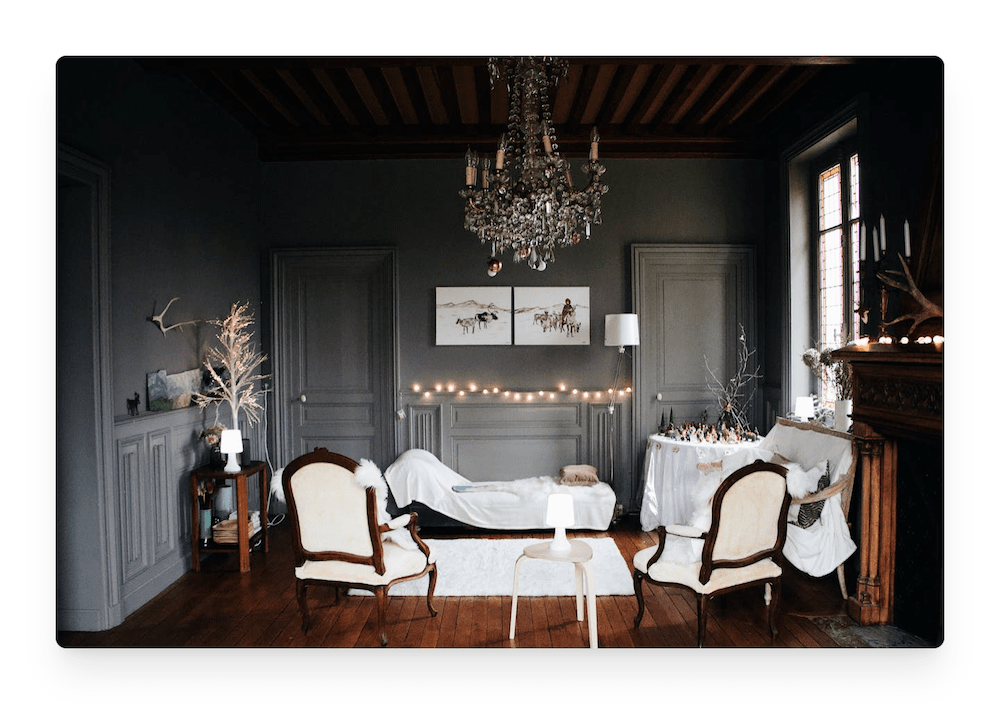
Photo by Maël BALLAND
1. Define your niche
Defining your niche is one of the most important steps when starting a home decor business because it sets the foundation for your brand identity and customer base.
Rather than trying to appeal to everyone, focus on a specific product type and aesthetic that reflect your vision. For example, you may specialize in handcrafted wall art, sustainable furniture, or decorative textiles.
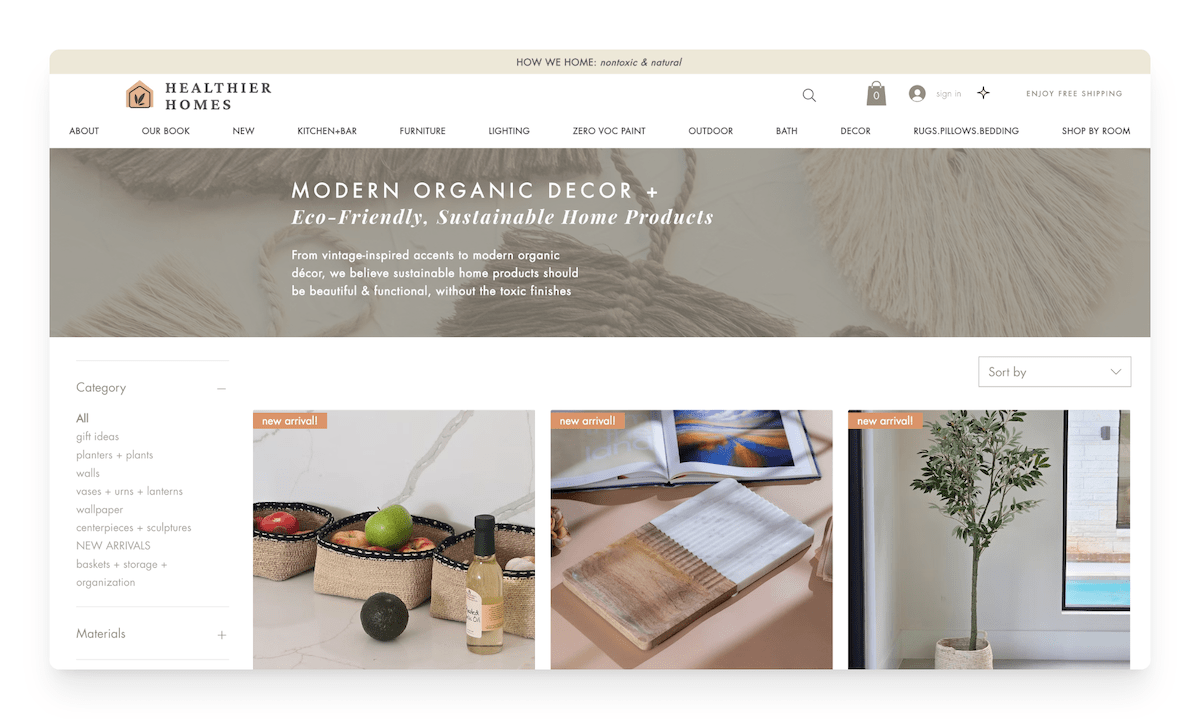
Healthier Homes, a home decor company selling eco-friendly, sustainable home products
Choosing a niche will allow you to develop expertise, streamline sourcing, and create consistent collections.
Alongside product type, consider the style or aesthetic you want to represent with your company, whether modern minimalist, bohemian, farmhouse, luxury, or eclectic. This stylistic direction influences everything from color palettes to materials and marketing.
Customers are more likely to connect with businesses that have a clear, cohesive look and feel. Taking the time to define your niche will allow you to create a recognizable identity that stands out in a crowded market and attracts buyers who resonate with your style.
2. Study the market and validate your idea
Before launching a home decor business, it’s also essential to study the market and validate your idea to ensure demand and reduce risks.
Start with competitor analysis:
research businesses offering similar products, noting their price ranges, bestsellers, marketing strategies, and customer reviews. This helps you identify market gaps and opportunities for differentiation.
Next, define your target audience by understanding who is most likely to buy your home decor business’s products. Consider factors like age, income, lifestyle, and design preferences. For example, young professionals may prefer modern, budget-friendly decor, while homeowners might invest in timeless, higher-end pieces.
Finally, pursue product validation by testing your concept before fully committing. This could mean selling a small batch online, gathering feedback through social media, or hosting a local pop-up. Validation confirms that your products resonate with buyers, which will in turn give you confidence to scale.
3. Write a business plan
At this point, you will have a clear idea of how to carry out your home decor business idea. It’s time to summarize all your ideas and thoughts in this essential document, the business plan.
As well as allowing you to write down all the most important elements of your structure, this step shouldn’t be taken lightly, as it’s the starting point for the future of your company.
Key elements to include in your business plan are the following:
- Executive summary: Provide an overview of your vision.
- Business description: Talk about your mission, niche, and products.
- Market analysis: Describe your competitors, target audience, and trends in the home decor industry.
- Marketing strategy: Explain your branding, pricing, and promotion tactics.
- Operations plan: Detail your ideas concerning suppliers, production, and logistics.
- Financial plan: Discuss your startup costs, revenue projections, and funding needs.
Writing a business plan forces you to think strategically, ensuring you’re prepared to attract customers, manage finances, and differentiate your brand in a competitive home decor market.
4. Build your brand identity
Building your brand identity is a crucial step in launching a home decor business because it shapes how customers perceive and connect with your company.
First things first, you need a business name—it should be memorable, easy to pronounce, and reflect your niche or aesthetic. A well-chosen name immediately sets the tone for your brand.

WiziShop’s artificial intelligence can help you come up with a great store name in just a few clicks. Simply select your language and add your niche or tagline to have the tool generate a list of names from which to choose!
It’s also crucial to design a logo that captures the essence of your style. Whether sleek and modern or warm and rustic, your logo becomes a visual signature across packaging, websites, and social media.
Equally important is your brand story, which communicates your values, inspiration, and purpose. This narrative gives meaning to your products and helps customers form an emotional connection. For example, sharing that your pieces are sustainably sourced or inspired by cultural traditions can build loyalty and trust.
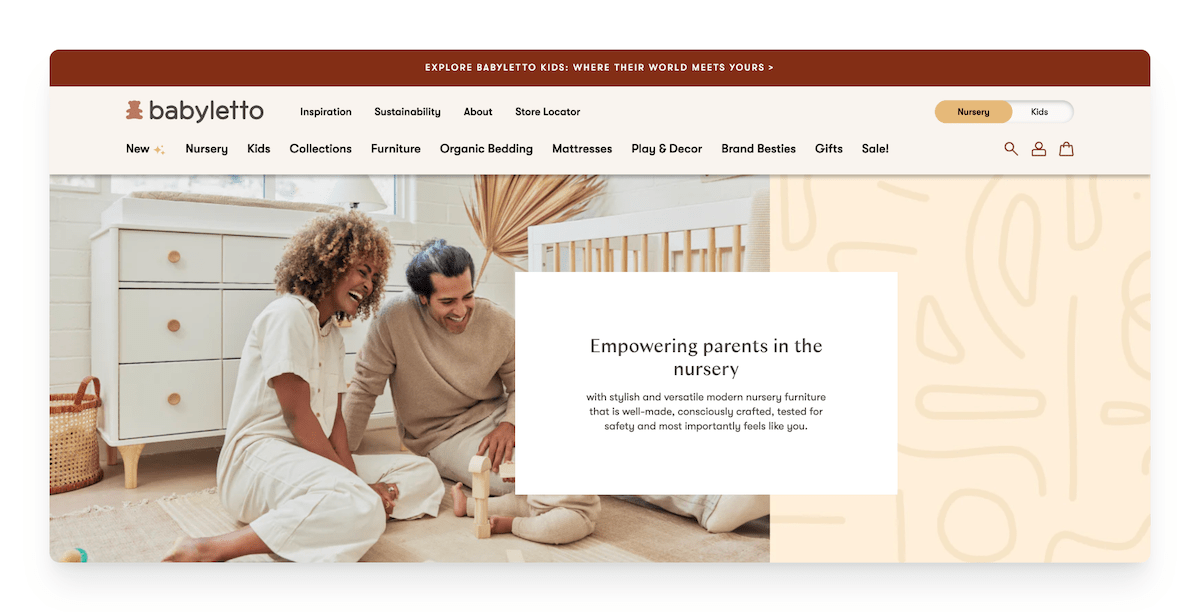
Babyletto’s “About Us” page tells the brand’s story and describes its values.
In addition, you’ll want to be sure to establish a consistent visual identity for your business, which includes your color palette, fonts, and overall design style. These elements should be in harmony with the home decor aesthetic you promote, e.g., minimalist neutrals, cozy farmhouse tones, or vibrant bohemian hues.
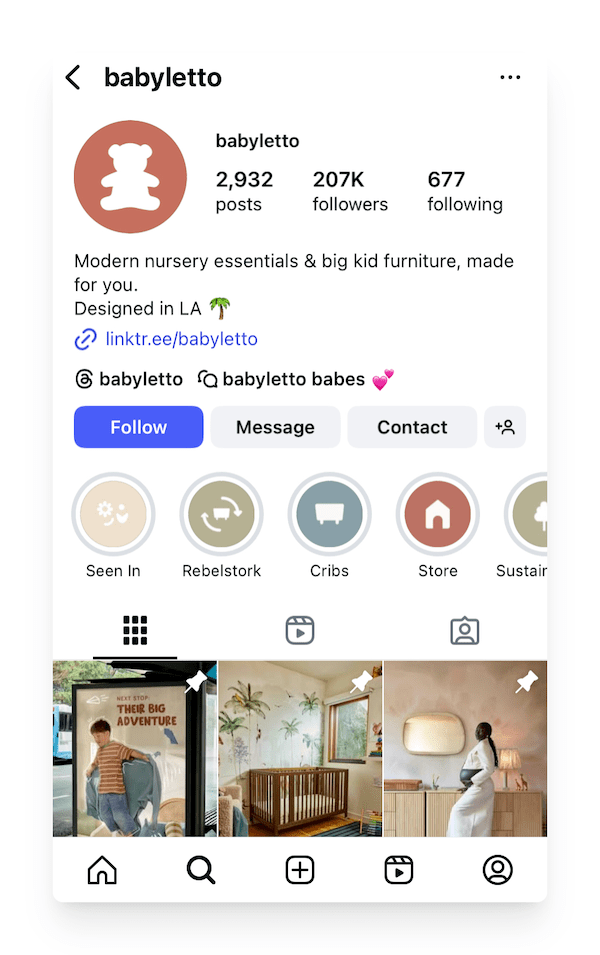
Babyletto’s soft, warm color palette aligns with the company’s modern, stylish, and consciously crafted designs and is consistent across the website and social networks.
Note that you will not want to leave anything to chance when it comes to your presentation. Plan to take the time to craft stunning visual markers that accurately define who you are, and feel free to get in touch with a communications agency to work with the best in the business.
5. Source or create your products
The next step is to decide how you plan to source or create your products. This choice shapes your pricing, operations, and brand positioning.
If you opt for handmade production, you’ll have full control over design, quality, and uniqueness, allowing you to offer one-of-a-kind or customizable items. Handmade pieces will often command higher prices, but they also require more time, skill, and resource management.
On the other hand, working with suppliers or manufacturers enables you to scale quickly, access a wider product range, and reduce production time. However, this route requires careful vetting to ensure product quality, ethical practices, and consistency.
There are several ways to find the top suppliers of home decoration products, including the following:
- Competitive intelligence: This will enable you to identify the products sold by your competitors and thus find the best names on the market.
- Trade shows: During the year, the trade show calendar is very full, allowing you to meet those businesses, craftspeople, and manufacturers who produce first-rate objects around the world.
- Auctions: Auctions are frequently organized to buy collectibles or unsold stock, often new, in bulk.
- Professional antiques and second-hand shops: Depending on the style of home decor you wish to sell, these second-hand outlets are a gold mine for finding treasures to resell on your ecommerce website.
- Private individual sales: Check out reseller sites like Craigslist and eBay or consider attending flea markets in your area to locate unique home decor items to resell on your online store.
Whichever path you choose, consider pricing strategies that reflect your costs, target market, and brand value. Handmade items may justify premium pricing, while supplier-sourced products often rely on competitive pricing and volume sales.
You will also need to plan logistics, including storage, inventory management, and shipping. Handmade businesses may start small with in-house storage, while supplier-based models might need fulfillment centers. Reliable logistics are essential to maintaining customer satisfaction and repeat business.
6. Create your online presence
You’re now ready to build your online store!
A well-designed ecommerce website that reflects your brand’s aesthetic and features clean layouts, consistent colors, and easy navigation can help build trust and professionalism.
Your online store’s product pages should showcase high-quality photos, detailed descriptions, pricing, and dimensions to help customers visualize items in their homes. Consider including lifestyle images for added inspiration.
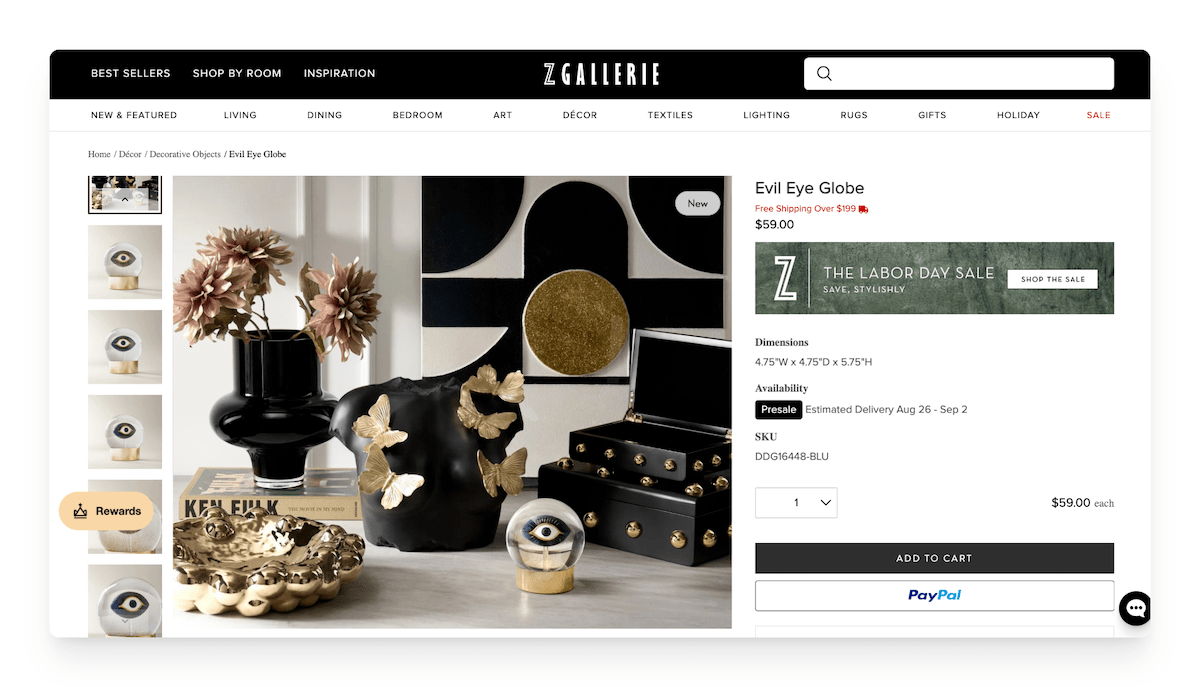
Example of a product shown in various scenarios on the Z Gallerie site
Don’t forget to add clear calls-to-action, a smooth checkout, and mobile optimization to ensure a seamless shopping experience.
Your website should be the showcase for your exceptional product catalog: your online store is your indispensable work tool, and it’s essential to the success of your business.
That’s why you need to choose the best platform on the market. And we’ve got a few ideas on the subject: read on to discover the name of your future ecommerce platform at the end of the article!
A rookie mistake for those starting their own ecommerce business is to think that once you’ve set up your website, it’ll be able to develop on its own. It won’t!
Plan to always be very vigilant and always aware of what’s happening on the internet. That’s why it’s advantageous to set yourself reminders to test your product offerings and services as if you were a normal user.
This is going to enable you to challenge yourself, but above all, to prevent bad feedback from shoppers due to issues that could have been avoided.
7. Promote your brand
You’re on the verge of launching your home decor business and making your designs and offerings available to the world. But have you thought about how you're going to get the word out about your business? Your digital marketing strategy will be essential to your brand’s success.
The first step will be to create a presence on social media networks like Facebook, Instagram, TikTok, Pinterest, etc. around your brand to highlight its DNA, tell your company’s story, and possibly even preview the products and offers proposed on your future ecommerce website.
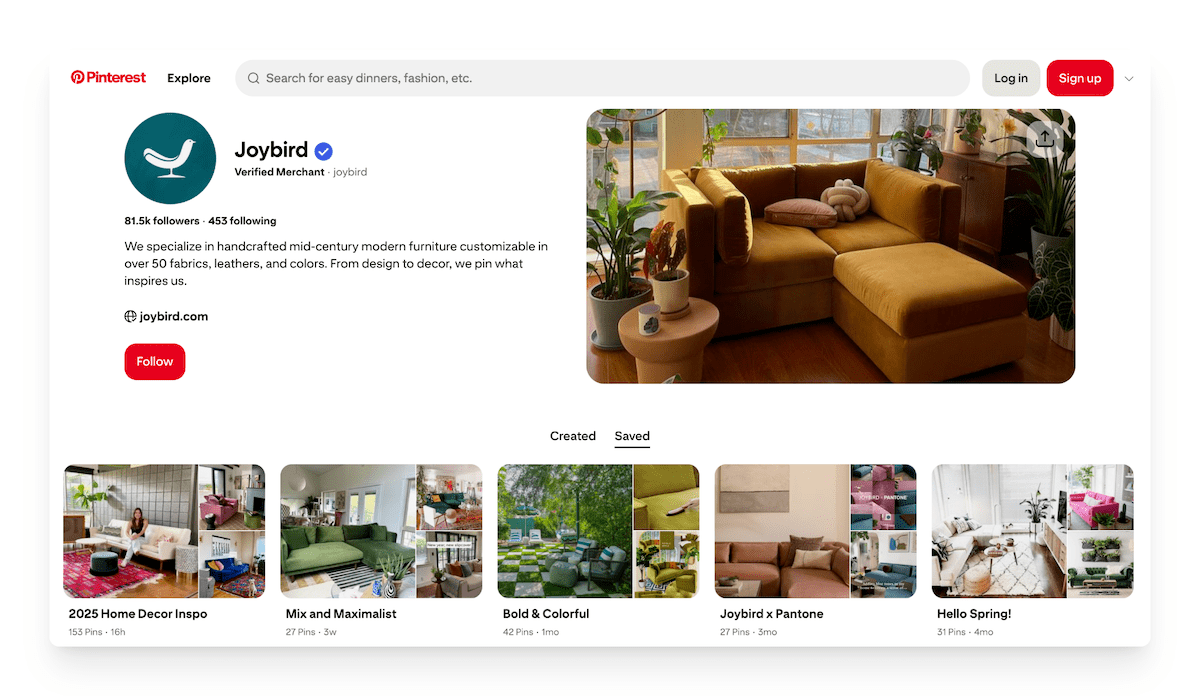
Home decor company Joybird on Pinterest
In addition to these initial marketing steps, a well-organized strategy will enable you to draw up a plan for the months following the opening of your business.
This is going to make it possible for you to start laying the groundwork for the various marketing levers you will be using: SEO, influencer marketing, email newsletters, social networks, online advertising, the writing of informative blog articles for people to read, SMS marketing... You’ll then be able to start your business more serenely.
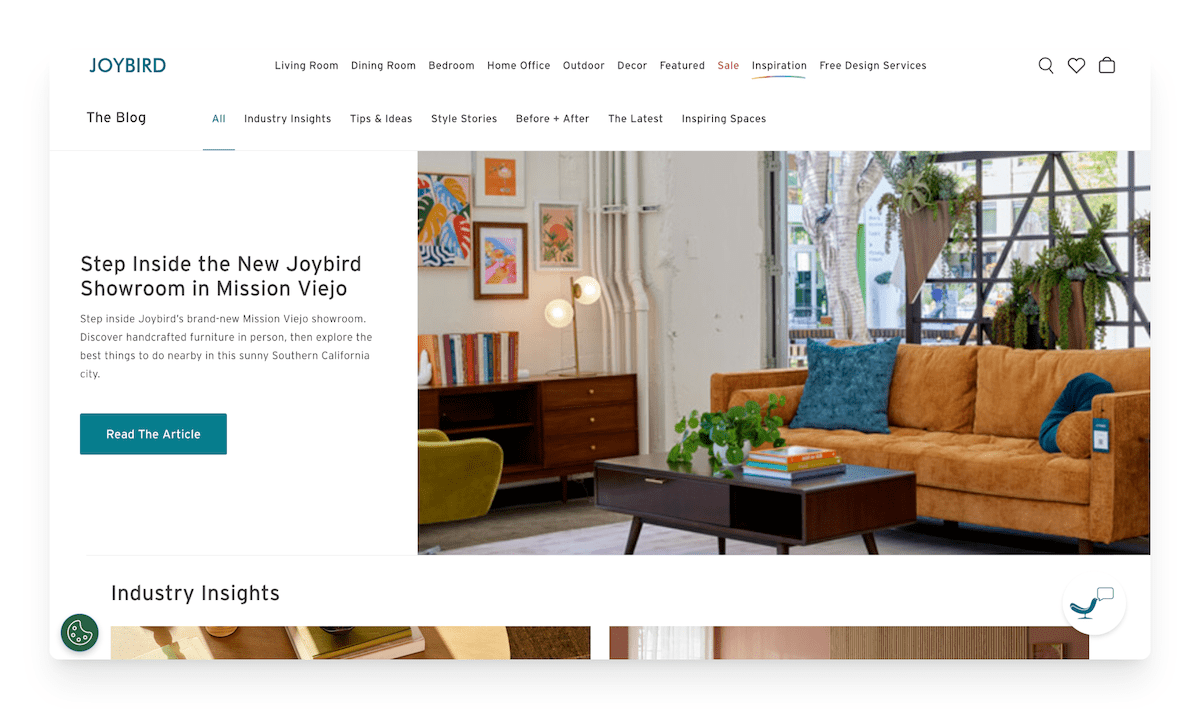
Blog featuring industry insights, tips and ideas, style stories, and more on the Joybird site
8. Manage operations and grow
After launching, your focus shifts to managing day-to-day operations and planning for growth.
Keep in mind that strong customer service is at the core of long-term success. Respond promptly to inquiries, handle returns or issues with professionalism, and personalize communication where possible. Positive customer experiences lead to repeat purchases and word-of-mouth referrals, which are both critical for building a loyal base for your home decor business.
Equally important is data monitoring. Track website analytics, sales figures, customer feedback, and inventory levels to identify trends and opportunities.
For instance, if certain products consistently sell out, consider increasing stock or expanding variations. If some items underperform, reassess pricing, marketing, or relevance to your niche.
Growth also involves strategic expansion. You might broaden your product range by introducing complementary items, such as adding throw pillows to a line of wall art, or launch seasonal collections to keep customers engaged.
Similarly, expanding sales channels via online marketplaces, social media shops, or local boutiques can help you reach wider audiences and diversify revenue streams.
Managing operations effectively while keeping an eye on growth ensures your business remains sustainable. By balancing customer satisfaction, data-driven decisions, and thoughtful expansion, you position your home decor brand for lasting success!
How do you create an online store to sell your decorative items?
Tables, chairs, knick-knacks, vases, kitchens, bathrooms, plants, lamps, cushions, rugs... Whatever your flagship product, WiziShop, the AI-powered ecommerce solution, can help you make a success of your online home decor business!
For over 15 years, the ecommerce platform has been helping thousands of entrepreneurs sell their products and services online. The SaaS solution is based on cloud computing: you can manage your online store from anywhere, as long as you have Internet access!
Starting at $24.90 per month, you benefit from over 400 features, 50+ SEO optimizations, personalized support from our team of expert ecommerce business coaches, and free ecommerce training.
At any time, our team is on hand to answer your questions and help you at every stage of your business life. With WiziShop, you'll never be alone with your ecommerce business.
What’s more, you can take advantage of the platform's powerful AI tool to create a variety of text content in a flash: product descriptions, translations, titles and meta descriptions, blog articles, and more!
Enjoy a 7-day free trial to test the solution and see why it's the best option available today to help you achieve ecommerce success!
Try WiziShop free for 7 days
THE EASIEST NO-CODE ECOMMERCE SOLUTION✅ No credit card required
✅ Access to all features
✅ No commitment
Home decor business FAQ
Do I need design skills to start a home decor business?
You don’t need formal design skills to start a home decor business, but having an eye for aesthetics and a good sense of style definitely will help you stand out. Many successful entrepreneurs rely on market knowledge, sourcing unique products, and strong branding, while hiring or collaborating with designers for creative expertise.
How much does it cost to launch a home decor brand?
The cost to launch a home decor brand can range widely, from a few hundred dollars for a small, handmade startup run from home to tens of thousands for a business with professional manufacturing, inventory, and marketing. Your expenses depend on factors like product type, production method, branding, website design, and whether you start lean or invest heavily upfront.
What are the best platforms to sell home decor products online?
The best platforms to sell home decor products online include ecommerce solutions like WiziShop for building branded stores, as well as marketplaces like Etsy for tapping into large customer bases. The right choice depends on whether you want full control over your brand and customer experience (own website) or quick visibility through established marketplaces.


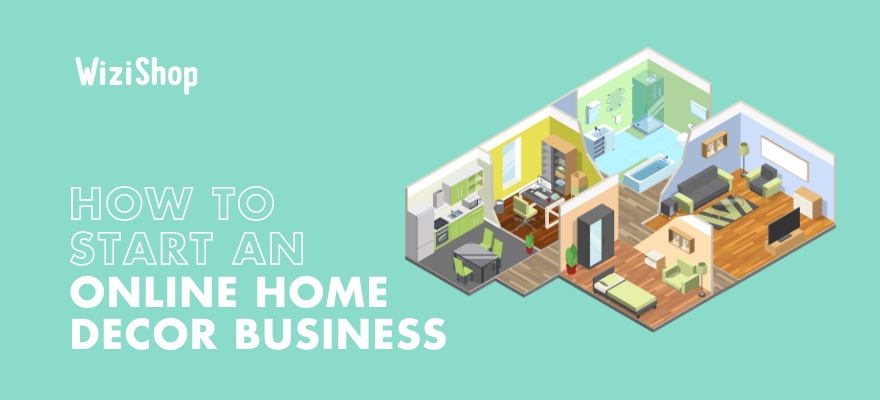







Artisticks le 25 September 2025 à 07:32